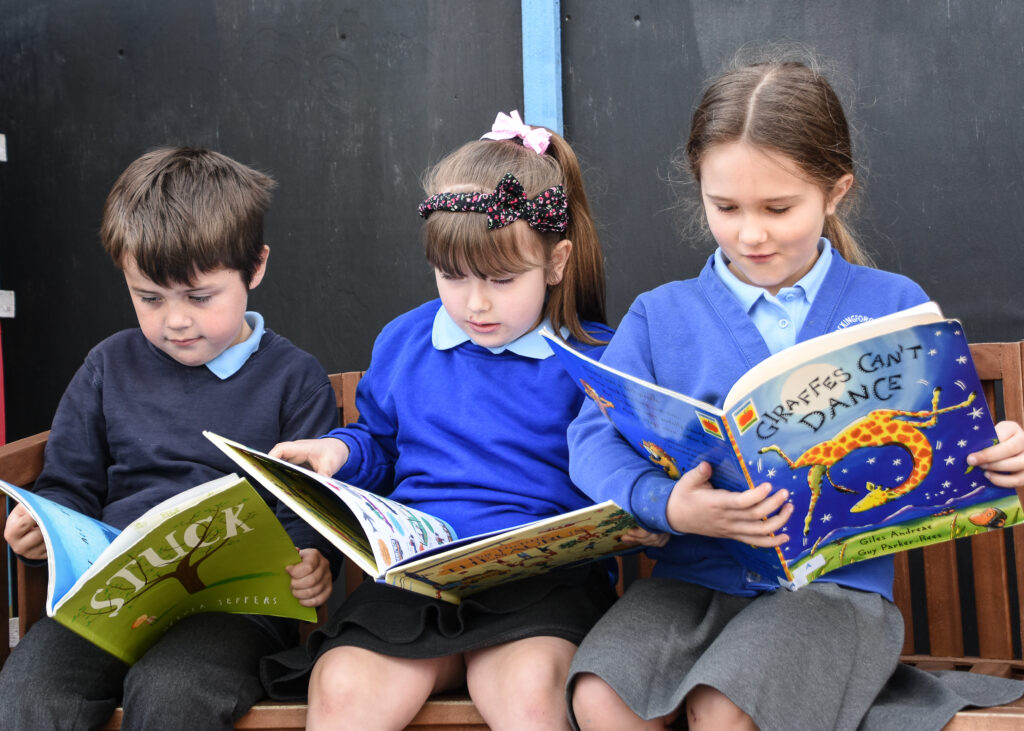Let’s Read
Not only does reading develop your brain but it provides a window into the world around you. Once you can read, everything else becomes so much easier. As well as reading at school, it is important for children to read at home too. However, we know that this can sometimes be tricky so here are a few strategies which may help you and your child to read together at home.

“The more that you read, the more things you will know. The more you learn, the more places you’ll go.”
Dr. Seuss
“If you are going to get anywhere in life you have to read a lot of books.”
Roald Dahl
Reading Websites
My child won’t read, no matter what I do. How can I help?
- Read to your child as much as possible
- Don’t make an issue out of it
- Talk to your child’s class teacher – working together will help
What else can your child read?
- Comics or Magazines
- Instructions or recipes
- Information books
- Newspapers
- Poems
- Recorded stories
Websites to help the development of Reading at home & School:
Oxford Owl Press – http://www.oxfordowl.co.uk
Wordsforlife.org.uk – http://www.wordsforlife.org.uk/
BBC Parenting website – www.bbc.co.uk/parenting
Booktrust – www.booktrust.org.uk
Supporting Reading at Home
Reading together at home is one of the easiest but most important ways in which you can help your child. As you share books you are helping improve your child’s reading skills and showing them how important and enjoyable reading is. We have a diverse range of books to support your child’s reading within the school, and this will enable your child to experience a range of authors and styles of books including non-fiction and poetry. In terms of reading, we want children to be able to:
- Enjoy reading and see it as a pleasurable leisure activity, as well as a means of following instructions and finding things out.
- Have the reading skills necessary to read a range of text types for pleasure and for information.
5 Ways to Share a Story
1. Take breaks while reading
You don’t have to read an entire book in one go. Even if it’s only a couple of minutes at a time, it will still be beneficial. Having breaks allows children to build up the mental stamina they need to read for longer stretches of time.
2. Build reading into your child’s daily routine.
You will know the best time to read. Perhaps your child has most energy in the morning so a few minutes before school is best. Or maybe, a bedtime story would be more suitable. Whenever it is, build it into your child’s routine so they know when to expect it.
3. Choose a book which will interest your child.
Let your child choose the books they read. Whether your books are owned or from the library, keep them on a shelf which your child has access too. It’s okay for them to read the same books over and over again. It will help younger children to understand and recognise words and how language is structured. When reading the book, let them turn the pages, skip pages, go back pages. Try to talk about the book too.
4. Using technology
When used appropriately, books on tablets can help with reading too. Use apps to read e-books and listen to audio books, perhaps when you’re in the car.
5. Pictures tell a story too
If your child isn’t confident with their reading, use the pictures to help tell the story. Ask questions about the pictures – what can they see? What is the character doing? What might happen next?

Questions for Reading
Talking about the book with your child will help your child in their enjoyment and understanding of the book.
- Did you enjoy that book? Why? Why not?
- Who was your favourite character? Why?
- Which part did you like the best? Why?
- Was there any part you didn’t like? Why?
- Would you choose this book/story again? Which books are best?
- Books your child likes.
- Books suggested by your child’s teacher
- Books your child chooses from a library or bookshop that they want to read
- Never be afraid of re-reading books
My child is a good reader. Can I still help? YES!
Although children will often want to read in their heads when they become fluent readers and you should not insist on too much reading aloud, there are still many things that you can do. Discuss with them what they have read – about the character, about the plot, about the important parts of the story, about what they have learnt from the information, about their feelings as they read the story.

